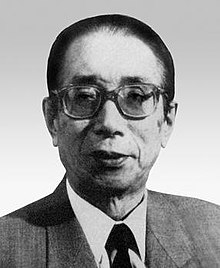Kim Won-gyun
Kim Won-gyun | |
|---|---|
 | |
| Born | 2 January 1917 |
| Died | 5 April 2002 (aged 85) |
| Occupation(s) | Composer, politician |
| Era | 20th century |
| Kim Won-gyun | |
| Chosŏn'gŭl | 김원균 |
|---|---|
| Hancha | |
| Revised Romanization | Kim Won-gyun |
| McCune–Reischauer | Kim Wŏn'gyun |
| [1][2][3] | |
Kim Won-gyun (
Career
In his youth, Kim Won-gyun attended high school but dropped out after three grades.
Kim is credited with contributing to "the creation of the 'Sea of Blood' -type revolutionary operas".[11] It is possible that he worked on the operatic version of Sea of Blood and a symphony based on music from the opera.[13] He is also credited with the opera Chirisan.[14]
Kim served as a composer to National Art Theatre.[7] He also became the head of the Central Committee of the Korean Musicians Union in 1954, and would later become the vice-president and president of the Union.[5] He was the president of the Pyongyang University of Music and Dance since 1960. In 1985, he became the general director of the Sea of Blood Opera Troupe.[5][11] He was the North Korean chairman of the Reunification Music Festival in September 1990.[5] He was also the chairman of the National Music Committee of Korea[15] and honorary member of the International Music Council.[16] Besides his musical activities, he was a deputy to the ninth and tenth Supreme People's Assemblies (SPA).[5] Upon his death in 2002, he held the posts of deputy to the SPA and adviser to the Central Committee of the Korean Musicians Union.[17]
He received many prizes and honors, including Labor Hero, Merited Artist, People's Artist, recipient of the Order of Kim Il Sung and a Kim Il Sung Prize winner.[5][16] The Pyongyang Conservatory was renamed the Kim Won-gyun Conservatory on 27 June 2006.[5][11]
Kim Won-gyun died on 5 April 2002 of heart failure. Kim Jong Il sent a wreath to his bier on the day following his death.[17] Kim Jong Un paid homage to Kim Won-gyun by organizing a concert on the centenary of his birth in 2017.[7]
See also
References
- ^ ISBN 978-0-7656-3523-5. Retrieved 5 July 2015.
- ^ "Gukka" 국가(國歌). JoongAng Ilbo (in Korean). Retrieved 5 July 2015.
- ^ George Ginsburgs (1974). Soviet Works on Korea, 1945-1970: Prepared for the Joint Committee on Korean Studies of the American Council of Learned Societies and the Social Science Research Council. University of Southern California Press. p. 137. Retrieved 5 July 2015.
- ^ a b 내나라 [Kim Won-gyun]. Naenara (in Korean). Archived from the original on 13 August 2009. Retrieved 5 July 2015.
- ^ ISBN 978-0-8108-7987-4. Retrieved 5 July 2015.
- ^ ISBN 978-1-84277-505-9. Retrieved 5 July 2015.
- ^ a b c "Kim Won Gyun, World-famous Composer". KCNA. 4 May 2018.
- ISBN 978-1-317-56741-7. Retrieved 5 July 2015.
- ISBN 978-1-86189-236-2. Retrieved 5 July 2015.
- ISBN 978-1-4330-2780-2. Retrieved 5 July 2015.
- ^ a b c d "Famous Musician Kim Won Gyun". KCNA. 30 June 2006. Archived from the original on 12 October 2014. Retrieved 5 July 2015.
- ^ "Kim Won Gyun concert". KCNA. 10 March 1997. Archived from the original on 12 October 2014. Retrieved 5 July 2015.
- ISBN 1-135-94690-6. Retrieved 5 July 2015.
- ^ "Korea". The Great Soviet Encyclopedia (3rd ed.). The Gale Group. 1970–1979. Retrieved 5 July 2015 – via TheFreeDictionary.com.
- ISBN 9788974330514. Retrieved 5 July 2015.
- ^ a b "Composer Living along with Conservatory". KCNA. 10 August 2009. Archived from the original on 12 October 2014. Retrieved 5 July 2015.
- ^ a b "Kim Won Gyun passed away". KCNA. 6 April 2002. Archived from the original on 12 October 2014. Retrieved 5 July 2015.
Further reading
- Kim Sunnam; Kim Won-gyun (1953). "Iskusstvo sluzhit narodu (O razvitii muzykainoi kultury Koreisko Narodno-Demokraticheskoi Respubliki)" [Art Serves the People: On the Musical Culture of the Korean People's Democratic Republic]. Sovetskaya Muzyka(in Russian) (3): 109–111.
External links
- Pyongyang Kim Won Gyun Conservatory website Archived 16 November 2022 at the Wayback Machine
- Bust in front of the Kim Won-gyun Conservatory at WikiMapia
- Article at Baike.com (in Chinese)
- Documentary on Channel A's channel on YouTube(in Korean)
- Documentary on Uriminzokkiri's channel on YouTube (in Korean)
- Video of bust in front of the Kim Won-gyun Conservatory (in Spanish)
- The cradle of North Korean musicians - Pyongyang Kim Won Kyun University of Music
- Seal of the Conservatory
